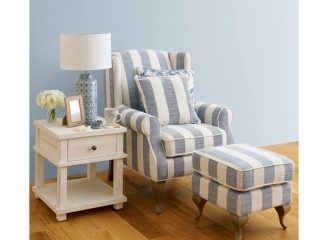
There are so many things out of your control – including your allergies. It could be mold, dust, pollen, or pet dander that causes you to feel uncomfortable. But, even though you can’t control how your body responds to these irritants, there are steps that you can take to allergy-proof your home. In this small article, we will take you through every room and give you some top tips to reduce allergies.
The Living Room
Let’s begin with the living room, which is the center of most people’s homes. It’s also the place with the most foot traffic, so it’s essential to pay close attention to this area. If you can, it’s a good idea to replace any carpets with wooden flooring. This is because it can prevent dust, and wooden floors are far easier to clean. If you have any rugs, make sure that you wash them at least once per week. If you have to keep your carpets, you can even shampoo them for a deep clean. After all, hoovering isn’t going to do the trick.
Choose furniture that is made of metal, wood, or leather as this is easier to clean. Just like your floors, try and clean your furniture once a week and deep clean once per month.
Consider keeping your windows closed during the summer months to prevent pollen from traveling inside. Also, keep your windows clean to help prevent mold and condensation. It’s a good idea to use curtains you can wash, as this will help to avoid a build-up of dirt.
When it comes to your fireplace, try to avoid wood-burning and opt for gas. This is because it can exacerbate any respiratory allergies you may have.
The Kitchen
Keeping your kitchen allergy free is simple, with a couple of tips. First, try to regularly clean your sink, counters, and cabinets. This will help to avoid the build-up of dust and dirt. It will also prevent insects from being attracted to your kitchen.
Properly disposing of your food waste and not leaving anything out on the countertops overnight can also help to prevent insects and rodents from paying a visit to your kitchen. This includes emptying your fridge of any food past its sell-by date and cleaning the back of the fridge.
While you cook (and after), make sure you use an extractor fan. This will help to reduce mold forming from any cooking moisture. It can also help to open the window while you’re cooking.
The Bedroom
Your bedroom is meant to be a heaven and a place that you associate with rest and relaxation. It’s therefore essential to keep it that way for the sake of your sleep health. The same tips for replacing carpets and using curtains that you can regularly clean also apply to your bedroom. This helps to make things easier for you to clean and will help to prevent allergic reactions from occurring.

Make sure that you wash your sheets once per week. You should also aim to purchase covers that are advertised as dust-mite proof. Another great way to prevent the build-up of dust is to reduce the clutter in your bedroom. This can include clothes, books, games, and so on. And we aren’t asking you to get rid of your possessions but to store them properly. For example, you could purchase specific storage boxes to help keep things organized and in their proper places. Reducing clutter will also help you to improve your sleep, as it makes your bedroom calmer.
Also, you can consider keeping natural aid on your nightstand to help alleviate allergy symptoms. Since Cannabidiol (CBD) plays a role in regulating many bodily processes, including immunity, and possesses potent anti-inflammatory properties, it may help relieve allergy symptoms. A 2005 study published in the Biochemical Journal found that CBD can help prevent cells from releasing histamine, which in turn can potentially reduce allergy symptoms. This supplement is available in various formats, such as tinctures, capsules, and topicals. Still, the main point here is to only purchase safe products like the ones from Naturecan CBD and start with low doses.
Finally, if you can help it, keep your pets out of the bedroom. Allowing your pet to sleep on your bed can increase the amount of pet dander you breathe in. If you can’t keep your pets out of your bedroom, then wash your sheets twice per week, keep them off of your pillows and bathe your pets once per week.
The Bathroom
Even though you don’t spend as much time in your bathroom as in the other rooms in your house, it’s still essential to be allergy-proof. In addition, it’s an important room to keep ventilated due to the build-up of condensation from baths and showers. Installing a fan or opening your window before you bathe can help to reduce this. If your bathroom doesn’t have a window, then it’s a good idea to install a fan to provide ventilation.
Mould can, unfortunately, build up in lots of areas of your bathroom. You should scrub your sink and toilet regularly, as well as your walls and floors. Any rugs in your bathroom should be washed once per week. This also goes for any shower curtains you have, as this is a prime place for mold to live.

Finally, make sure that you repair any leaks that occur in your bathroom quickly. This will prevent not only mold but also any safety issues.
Attic/Basement
Keeping your basement and attic ventilated is super important. Therefore, your best option is to invest in a dehumidifier and to make sure you clean it out regularly. This can help to prevent mold. You should also consider repairing leaks and removing any water-damaged furniture or carpets. Also, make sure that you store everything properly so that it doesn’t become damaged. Plastic boxes are a good idea.
Final Tips
Here are a few important tips for you to consider:
Smoking
If you smoke, then don’t smoke indoors. Make sure that your guests also abide by this rule.
Clean
Get into the habit of a cleaning routine. Some of you may need to do this more often than once per week, depending on how severe your allergies are. Make sure that you dust all surfaces, mop floors, wash your rugs, and don’t forget to clean down your appliances, such as your TV and radio. To help prevent irritation while you clean, you should wear gloves and a mask.
Pest Control
At the first sign of any infestations, it’s a good idea to contact a professional. They can remove the pests and provide you with the correct advice to help prevent the problem from occurring again.
Bottom Line
We hope that you find these tips helpful and that they can improve your quality of life. Remember – your home should be a safe place to relax, so don’t let allergies prevent you from feeling this way. Be proactive, and you’ll no doubt feel more comfortable in no time.



